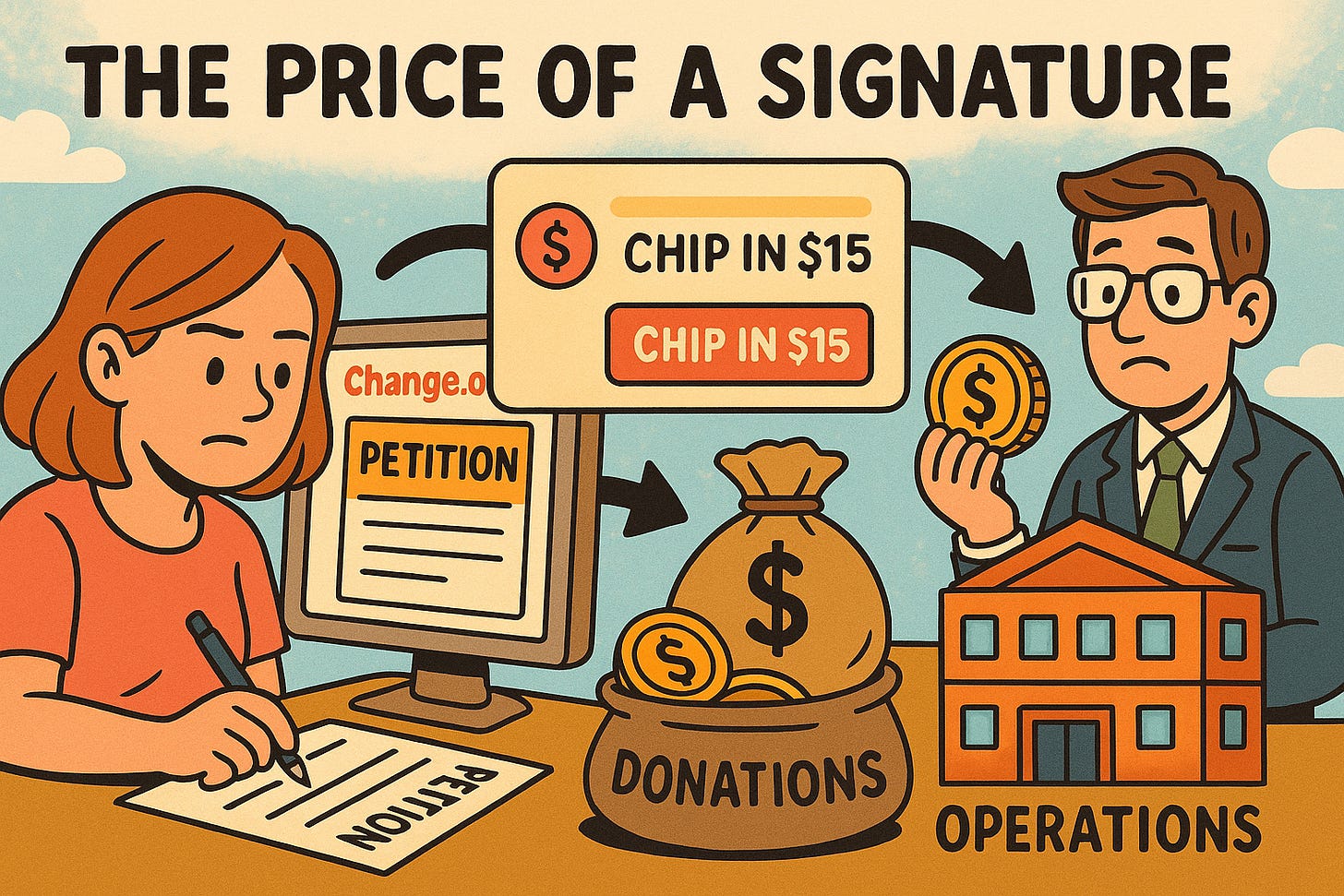Click, Sign, Donate: The Curious Case of Change.org’s Endless Fundraising.
When Petitions Become Paywalls: A Forensic Dive into the World’s Most Persistent Digital Tip Jar.
The Price of a Signature:
In the digital age, activism has found a new home on platforms like Change.org, where starting a petition is as easy as clicking a button. Yet, with every signature comes a familiar prompt: a request for a donation. I wanted to explore the financial underpinnings of Change.org, scrutinising where the money goes, the organisation’s structure, and the implications for users and causes alike.
The Mechanics of Monetisation:
Change.org operates as a certified B Corporation, blending profit motives with social objectives. Despite its “.org” domain suggesting non-profit status, the platform is a for-profit entity. The company encourages users to “chip in” after signing petitions, implying that donations will support the cause at hand. However, these contributions primarily fund Change.org’s operations, including promoting petitions and covering overhead costs.
Notably, the platform previously offered a fundraiser tool allowing petition creators to raise money directly for their causes. This feature was discontinued in 2019, leaving Change.org as the primary beneficiary of post-signature donations.
According to ProPublica’s Nonprofit Explorer, the Change.org Charitable Foundation reported revenues of $79.4k in 2023, with expenses totalling $4.33 million and assets amounting to $118 million. While these figures pertain to the foundation, the for-profit arm’s financials are less transparent.
Glassdoor estimates the CEO’s annual compensation to be around $156,000, though this figure may not encompass all forms of remuneration. The lack of comprehensive financial disclosure raises questions about the allocation of donated funds and the overall financial health of the organisation.
Case Studies: High-Profile Controversies:
The George Floyd Petition.
Following the murder of George Floyd, a Change.org petition garnered over 17.5 million signatures. Accompanying this was a significant fundraising effort, with reports indicating that approximately three million people donated via the “chip in” feature. Critics argued that donors were misled into believing their contributions would directly support Floyd’s family or related causes, whereas the funds were used by Change.org for petition promotion and operational costs.
The Raygun Petition.
In 2024, a petition targeting Australian breakdancer Rachael “Raygun” Gunn and Olympic chef de mission Anna Meares was removed after the Australian Olympic Committee condemned it as defamatory and bullying. The petition had amassed over 45,000 signatures and highlighted the potential for misuse of the platform, raising concerns about the vetting process and the ethical implications of monetising such content.
Ethical Considerations and Public Perception.
The persistent solicitation of donations, especially for petitions that do not require financial support, has led to public skepticism. The platform’s model blurs the line between activism and commerce, potentially exploiting users’ goodwill. Moreover, the lack of transparency regarding the use of funds and the organisation’s for-profit status, despite its “.org” domain, potentially misleads users about the nature of their contributions.
Navigating the Digital Activism Landscape:
Change.org has certainly revolutionised the way people engage with social causes, providing a platform for voices that might otherwise go unheard. However, the organisation’s fundraising practices warrant scrutiny. As digital activism continues to evolve, transparency and ethical considerations must remain at the forefront to maintain public trust and ensure that the spirit of advocacy is not overshadowed by profit motives.
Note: This opinion is based on publicly available information and aims to provide a critical perspective on Change.org’s fundraising practices. Readers are encouraged to conduct further research and consider multiple viewpoints when evaluating the platform’s operations. Because frankly, we've given change.org a hell of a lot of money, and I don't want them using any of that, to be suing me.
The Racist Voter Dilemma: When Winning Means Wooing the Worst:
It was a surreal moment: Piers Morgan, the perennial provocateur, found himself in the rare position of moral high ground. In a recent interview on his show, “Piers Morgan Uncensored,” he confronted a guest who unabashedly admitted to using racial slurs, including the N-word, and recounted instances of overt racism without a hint of remorse. Morgan, oft…





For years I've known that change.org is a totally unethical organisation. A long email correspondence with them made it clear that they are totally comfortable with the information circulated with a petition, encouraging me to sign it, being untrue. (And
this would not be evident to anyone to whom the petition was presented, since the information in question was not included in the text of the petition).
I've signed a couple of Change.org's petitions, but have always wondered if these organizations are more committed to themselves than to the issues. Being on the right side of an issue seems to be a good way to generate income, as you've pointed out, James. I've never chipped in, but thanks for the heads-up!